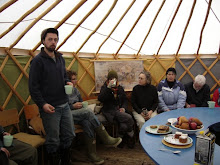
I found myself downstairs with a mundane task, but noticed the sunlight. So I stood outside. I noticed the garden, so I went and envisioned the transformation of weeds and garbage to fresh chard and tomatoes. So I set to it.
The magician's wife, an odd elderly neighbour of mine, enthusiastically called across the street to me of the wonders of gardening. "Sometimes I wear gloves," she yelled, "but sometimes I just use my bare hands and let the dirt dig deep beneath my finger nails," and off she marched.
As batty as the magician's wife may be, she is of course not the only woman to be seen on my city block out in their yards with their trowels and their garden forks. There is indeed something archetypal about women and gardening, which is perhaps hard to believe when it is hidden by modernity and cliché. But nevertheless, I believe it is there.
The sowing of a seed: utter disbelief that it could grow to be a full plant within weeks. The creation of a garden: such immediate satisfaction because you can see the product of your labour. But you can only possess it as much as you can possess a child. Dressing, feeding and keeping it tidy; you can in part call it yours, but is it really? A composer creates music, but has he created sound? In the same way a woman creates a garden or a child, but at every moment she is aware that it is Nature, self-sufficient and all-consuming that is responsible for the creation. Nature created her, it works through her, and she interacts with it through her will. Who else but one who plants seeds and watches them grow knows that it is Nature that has allowed for such a creation, and that she is only responsible for arranging it: choosing what notes, played for how long and it what order.

No comments:
Post a Comment